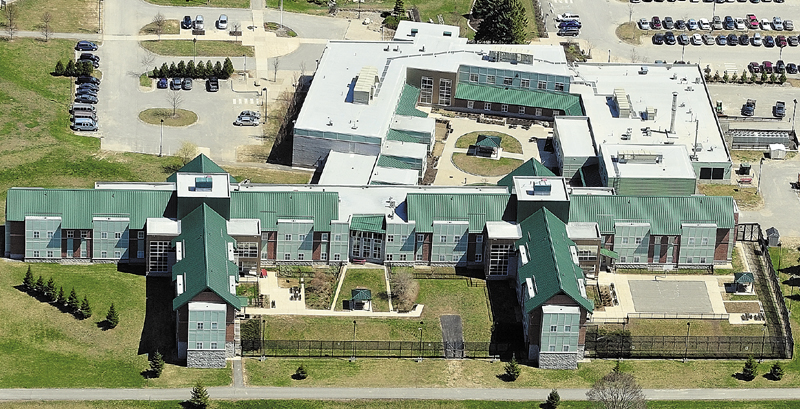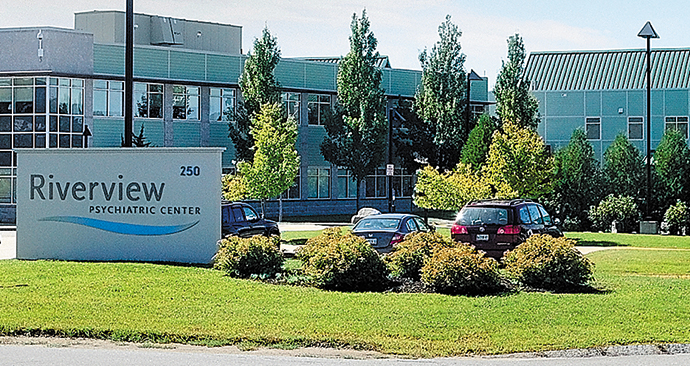AUGUSTA — The Riverview Psychiatric Center in Augusta is in danger of losing about $20 million in federal funding because the facility is out of compliance with federal guidelines.
The federal Centers for Medicare & Medicaid Services alerted the Maine Department of Health Human Services on Wednesday that federal dollars will stop flowing to Riverview after Sept. 2. The federal reimbursement comprises more than half of the 92-bed psychiatric center’s operating budget.
The issue has touched off a conflict between Gov. Paul LePage and the Democratic-controlled Legislature. The governor notified Democratic leaders about the funding cutoff through a news release issued Thursday evening. In the release, LePage blamed the Legislature for not funding his proposal to alleviate overcrowding problems at Riverview by creating a mental health ward at the Maine State Prison in Warren with forensic beds for individuals who pose a risk of serious harm to themselves or others because of mental illness.
Overcrowding and inadequate staffing to evaluate patients coming through the corrections system were among the violations cited by the federal government after the Maine Department of Health and Human Services performed an audit of the facility on March 29. According to documents provided by the Centers for Medicare & Medicaid Services, the first violation notice sent by the federal government to Riverview arrived April 17. Subsequent notices identifying additional violations and rejections of the facility’s mitigation plan were sent June 4 and July 29.
LePage’s proposal, L.D. 1515, was first introduced to the Legislature on May 7 and the bill was unanimously endorsed by the Criminal Justice and Public Safety Committee. The proposal would have cost the state $3 million annually for about 15 new positions at the state prison.
Democratic lawmakers say they were unaware of the audit and the threat of losing federal funding until Thursday’s news release. Additionally, Democratic leaders forwarded a June 25 email from DHHS Commissioner Mary Mayhew’s legislative liaison, who asked lawmakers to carry over the bill until next session. The session begins in January, but lawmakers may return earlier to take up the governor’s political appointments and, potentially, a state borrowing package.
The governor, in a written statement, urged lawmakers to take up the proposal sooner, but not before blaming them for funding other legislative priorities such as state aid to municipalities.
“Democratic leadership and certain members of the Appropriations Committee made the decision to fund other things, such as revenue sharing, while ignoring the needs of our mentally ill,” LePage said. “Our Administration worked diligently to provide information to the Legislature knowing that certification and critical funding for Riverview was in jeopardy yet there was a failure to act.”
On Friday, Rep. Mark Dion, D-Portland, House chairman of the Criminal Justice and Public Safety Committee, said Thursday was the first time he’d heard of the potential loss in federal funds.
The audit, and potential loss of federal funding, were not mentioned in any of the written testimony presented with L.D. 1515, according to legislative records.
Senate President Justin Alfond, D-Portland, acknowledged in a statement sent Thursday that the issue is serious.
“I will be calling the governor to address this issue in the morning,” said Alfond. “Now is not the time for partisan politics. We should move quickly to make sure we take care of our mentally ill and ensure public safety.”
Despite the federal notice and the blame exchange between LePage and lawmakers, Mary Louise McEwen, the superintendent at Riverview, told the Press Herald on Friday that she’s confident that a correction plan negotiated with federal authorities will pre-empt the loss of federal dollars. That plan, McEwen said, has been in the works since the first audit, although the federal government has twice rejected the facility’s mitigation strategy.
According to McEwen, the audit was prompted by a March 16 assault at Riverview in which 47-year-old Mark Murphy, a patient, allegedly attacked a 26-year-old mental health worker, punching her, striking her with his hands and stabbing her with a pen before another patient intervened.
The attack highlighted growing concerns by law enforcement and mental health advocates that Riverview is struggling to handle a sharp uptick in mental health patients channeled through the corrections system.
In May, a review of data by the Kennebec Journal showed there were 37 injuries at Riverview in 2012, the most since 2009, when there were 53. According to the report, the data didn’t tell the whole story. Employees at the hospital and the unions representing them cited increasingly brutal attacks.
Many of the patients at Riverview first arrive at county jails, which have been reporting an increase in forensic patients for several years, according to Col. Mark Westrum, administrator of the Two Bridges Regional Jail in Wiscasset.
Westrum attributed the increase to changes in policies dealing with the mentally ill and the loss of funding for support services.
“A lot of these people have ended up out on the street,” he said. “Whether it’s from a lack of housing or treatment, they’ve ended up in the county jails.”
The inmates posing risks to themselves or others are then pushed to Riverview for evaluations. That’s where the bottleneck is, Westrum said.
The psychiatric center is the state’s only hospital for forensic patients — people committed to state custody after being found not criminally responsible for criminal offenses.
According to state officials, the number of forensic patients at Riverview has increased dramatically. McEwen said Friday that there are 44 beds dedicated to forensic patients. She said there is an average daily waiting list of five to seven people coming from county jails and nearly a dozen from court-appointed evaluations, which are the hospital’s top priority.
The hospital has about 300 employees to manage and treat an average population of 83 patients, McEwen said.
McEwen said Friday that the passage of L.D. 1515 may not have prevented the federal notice of violation, but it may have helped negotiations with authorities of a mitigation plan. Asked if she informed lawmakers that the proposal may have assisted in those efforts, McEwen said that advocacy for the bill was handled by DHHS officials.
“Commissioner Mayhew has been very supportive of the bill,” McEwen said.
However, it’s unclear why officials at DHHS asked lawmakers to hold the bill until next session. According to a June 25 email from Nick Adolphsen, Mayhew’s legislative liaison, to the budget-writing committee, the department believed L.D. 1515 was “an essential reform for both Riverview” and the Corrections Department. However, Adolphsen continued, “we understand the limited availability of funding.”
Adolphsen’s email was sent well after lawmakers had negotiated a deal on the state budget. The Legislature overrode LePage’s veto of the budget on June 26. The bill was carried over July 10.
On Friday, a spokeswoman for DHHS forwarded all questions to McEwen.
According to her written remarks from the May 10 public hearing on L.D. 1515, McEwen did not mention the audit or the pending federal action to the criminal justice panel. She did, however, underscore the importance of the bill and increasing safety problems at Riverview.
She said staff at Riverview rarely report assaults at the facility. However, there were 102 injuries reported in 2012. Sixty-five of the injuries were inflicted by forensic clients, resulting in 23 injuries that could have warranted loss of work time because of federal work-safety laws.
“When clients at Riverview are violent and aggressive, not only are staff at risk, but often other hospital clients who, because of their illnesses are vulnerable, are at risk and often easy prey for those with violent tendencies,” McEwen told the panel.
Riverview received more than $18.2 million in Medicare and Medicaid reimbursements in fiscal year 2012. The federal appropriation has fluctuated year to year.
Lawmakers could take up L.D. 1515 in a special legislative session, but it’s not yet clear if the state has funding for the bill. The Legislature’s nonpartisan fiscal office recently reported a $58 million revenue surplus from the fiscal year that ended June 30.
Steve Mistler can be contacted at 791-6345 or at:
smistler@pressherald.com
Twitter: @stevemistler
Copy the Story LinkSend questions/comments to the editors.




Success. Please wait for the page to reload. If the page does not reload within 5 seconds, please refresh the page.
Enter your email and password to access comments.
Hi, to comment on stories you must . This profile is in addition to your subscription and website login.
Already have a commenting profile? .
Invalid username/password.
Please check your email to confirm and complete your registration.
Only subscribers are eligible to post comments. Please subscribe or login first for digital access. Here’s why.
Use the form below to reset your password. When you've submitted your account email, we will send an email with a reset code.